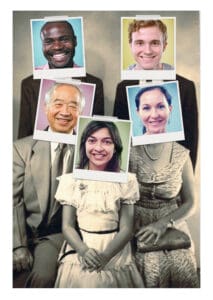
The coronavirus makes this a scary, dangerous time. None of us knows what our situation will be in two or six weeks. That is frightening.
Of course we know we need to avoid the panicmongers and listen to our best health professionals. If we obey the advice to keep a physical distance from others, stay at home, and wash our hands, most of us will be safe. We should also contact our politicians in Washington to insist that necessary, drastic economic measures focus especially on the poor members of society.
We should contact our politicians in Washington to insist that necessary, drastic economic measures focus especially on the poor members of society.
In a year (maybe even in four to six months) things will look better. But that does not change the fact that our current situation is genuinely frightening.
So where is the solid rock on which to stand? What can keep us going without undue panic and immobilizing anxiety?
The most important answer is simple: Easter morning.
I believe Jesus conquered death that first Easter morn. I believe the tomb was empty. I believe Satan played his best card that dark, dismal Friday two thousand years ago. And by the third day, it was clear he had lost. Jesus’ resurrection from the tomb is God’s powerful, visible sign that Satan will finally lose everywhere. His grand design to destroy God’s good creation will fail. The last word will be resurrection and new creation. Satan just pretends he is the ruler of this world. It belongs to the crucified and risen Servant, who will reign forever and ever.
Because of this, I know where history is going. The final word is not coronavirus, death, injustice, oppression, or a dead planet. The Almighty One who raised my Lord Jesus will have the last word. That is what can keep us going.
The historical evidence for Jesus’ life and resurrection is stronger than for many events in ancient Greek and Roman history that historians accept as assured history. I will never forget a conversation I had decades ago with German theologian Wolfhart Pannenberg about Jesus’ resurrection. Twice Pannenberg said, “The evidence for Jesus’ resurrection is so strong that nobody would question it except for two things: first, it is a very unusual event; and second, if you believe it happened, you have to change the way you live.”
I hope we allow Jesus’ resurrection to shape the way we live now during the coronavirus. And I also trust we will let it shape the way we hope. We expect to see Jesus. We believe that he will make good on his promise to complete his victory over the devastation Satan has caused in God’s wonderful world.
Dangerous pandemics, broken marriages, corrupted cultures, unjust systems, drug-scarred bodies, and polluted rivers are not the last word. Jesus is coming back.
When he does, every believer will be raised bodily to dance forever in Christ’s eternal kingdom. Even the nonhuman creation gets to join the party (Romans 8:21). No more coronavirus!
Revelation promises that at the Risen One’s return, “He will wipe away every tear from their eyes. There will be no more death or mourning or crying or pain” (Revelation 21:4). That promise keeps us going!
A solid confidence in the Resurrected One’s ultimate victory, however, is not a cheap substitute for hard work now. Nor is it a safe bypass around pain and agony.
The Risen One calls us to labor diligently. Virtually every New Testament passage on the hope of Christ’s return ends with an imperative. Paul’s soaring resurrection promises in 1 Corinthians 15 ends with the command to work faithfully now: “Therefore, my beloved [that is, because Christ will return], be steadfast, immovable, always excelling in the work of the Lord, because you know that in the Lord your labor is not in vain” (1 Corinthians 15: 58).
The resurrection does not exempt us from hard, courageous work now. It does not prevent struggle, agony, failure, even death. Good Friday comes before Easter.
That means now: making sure the poorest, weakest members of our community are cared for. That means telephoning family, friends and neighbors because we cannot visit. That means checking to make sure that the most vulnerable have food. That means daring, as healthcare professionals, to carry on even when it is dangerous. That means following the example of the Christians in the second and third centuries who in times of devastating plague, cared both for other Christians and their non-Christian neighbors. As a result, many Christians also died. But their courage and love drew their neighbors to Christ.
The resurrection does not exempt us from hard, courageous work now. That means making sure the poorest, weakest members of our community are cared for now.
We work now knowing that Good Friday is not the last word. As disciples of the Resurrected One, we labor now, even in the worst of times, knowing that finally our efforts will not be in vain.
Those who understand the empty tomb can afford to face danger. Why? Because we know that in a day, or two, or a million, the Galilean champion of the sick, weak, and marginalized will return. In the twinkling of an eye, he will trump Satan’s last card.
The kingdoms of this world will become the kingdom of our risen Lord.
 Ron Sider is the Founder and President Emeritus of Christians for Social Action. This article first appeared on his blog, and is reprinted here with permission. Subscribe to Ron’s free blog here!
Ron Sider is the Founder and President Emeritus of Christians for Social Action. This article first appeared on his blog, and is reprinted here with permission. Subscribe to Ron’s free blog here!


